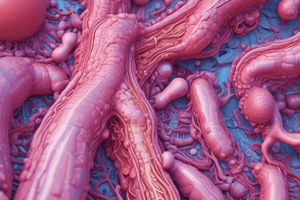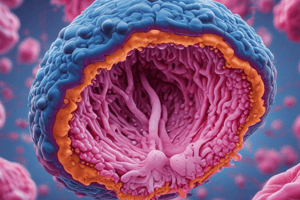Podcast
Questions and Answers
Which type of lymphoma is most strongly associated with Helicobacter pylori infections?
Which type of lymphoma is most strongly associated with Helicobacter pylori infections?
- B-cell lymphoma of the stomach (correct)
- Follicular lymphoma
- T-cell lymphoma
- Mantle zone lymphoma
What is the mechanism by which chemical carcinogens can lead to cancer development?
What is the mechanism by which chemical carcinogens can lead to cancer development?
- They cause direct DNA damage leading to mutations. (correct)
- They require metabolic conversion to an active form to become carcinogenic.
- Both direct-acting and indirect-acting carcinogens work through the same mechanism.
- They stimulate cell proliferation without causing DNA damage.
Which of the following is NOT a mechanism by which tumor promoters can enhance tumorigenesis?
Which of the following is NOT a mechanism by which tumor promoters can enhance tumorigenesis?
- Causing DNA damage and mutations in cells. (correct)
- Increasing the conversion of indirect-acting carcinogens to active forms.
- Directly stimulating the proliferation of mutated cells.
- Inducing tissue injury and regenerative repair.
What is the primary mechanism by which ionizing radiation can lead to carcinogenesis?
What is the primary mechanism by which ionizing radiation can lead to carcinogenesis?
Which of the following is NOT a common paraneoplastic syndrome associated with tumors?
Which of the following is NOT a common paraneoplastic syndrome associated with tumors?
Which of the following inherited genetic syndromes is associated with an increased risk of colorectal cancer?
Which of the following inherited genetic syndromes is associated with an increased risk of colorectal cancer?
What is the primary difference between tumor grading and tumor staging?
What is the primary difference between tumor grading and tumor staging?
Which of the following is NOT a characteristic of direct-acting chemical carcinogens?
Which of the following is NOT a characteristic of direct-acting chemical carcinogens?
What is the primary mechanism by which UV radiation from sunlight can lead to the development of skin cancers?
What is the primary mechanism by which UV radiation from sunlight can lead to the development of skin cancers?
Which of the following inherited genetic syndromes is associated with an increased risk of breast and ovarian cancer?
Which of the following inherited genetic syndromes is associated with an increased risk of breast and ovarian cancer?
Flashcards are hidden until you start studying




